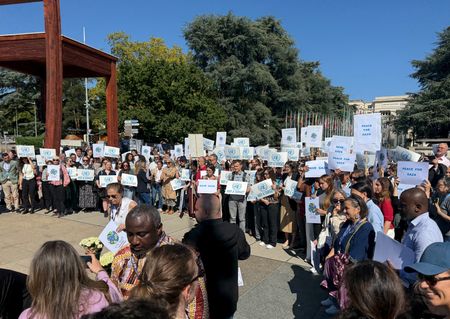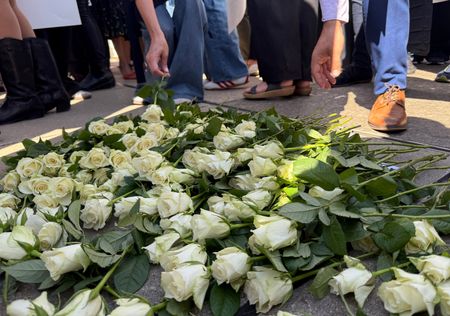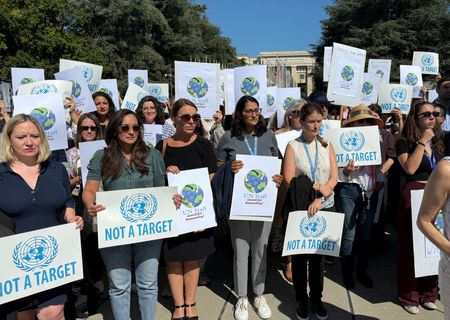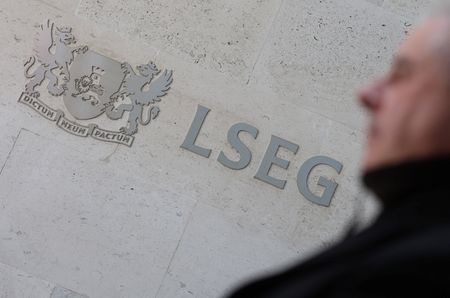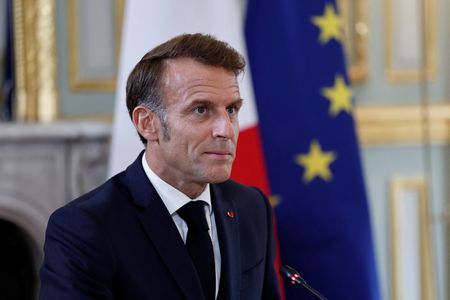By Emma Farge and Olivia Le Poidevin
GENEVA (Reuters) -The United States and Israel have sent complaint letters to top U.N. officials contesting the impartiality of their staff over the Gaza war, documents showed, as hundreds of U.N. staff protested outside its European headquarters on Thursday.
U.N. staff carried placards saying “Peace for Gaza” and “Not a Target”. They laid over 370 white roses next to a memorial plaque in Geneva to represent each U.N. aid worker killed in the nearly two-year war.
“Today, the U.N. staff are coming together to say that enough is enough, to say that we cannot kill our colleagues in Gaza with such impunity and to say stop to all these murders,” Nathalie Meynet, president of the U.N. refugee agency staff council, told Reuters at the protest.
The letters highlight the rising tensions between the U.N. and its top funder, the U.S., which has already disengaged from the U.N. Human Rights Council over what Washington says is its anti-Israel stance.
ISRAEL’S UN AMBASSADOR DENOUNCES EVENT
Israel’s ambassador to the U.N. in Geneva Daniel Meron wrote ahead of the event to the Director-General of the United Nations’ Geneva office Tatiana Valovaya denouncing the event.
“U.N. staff are not activists or political actors…Those who incite and participate in such politically charged activities should face disciplinary measures, including suspension,” his letter dated September 10 showed.
Séverine Deboos, one of the events’ organisers, denied that its purpose was political: “The message is in honour of our colleagues (in Gaza) and to thank them,” she said.
Israel says it takes care to avoid civilian deaths in its war with Hamas.
‘GRAVE VIOLATION OF NEUTRALITY’
Several hundred people joined in the protest and a minute of silence in the bright Geneva sunshine outside the U.N. building.
Earlier this week, a thousand U.N. employees joined an online briefing with Francesca Albanese – a U.N. independent expert whose criticism of Israel has led to U.S. sanctions.
Both Israel’s Meron and U.S. Charge d’Affaires Tressa Finerty complained to Valovaya about the call, with the latter saying in her September 16 email that the matter would also be raised with United Nations Secretary-General Antonio Guterres.
“This is a grave violation of the U.N.’s principle of neutrality on multiple levels,” said Finerty in an email.
“If U.N. staff during the U.N. workday, using U.N. email addresses and U.N. computers on U.N.-suppplied smartphones, participate in this Teams meeting, there can be no dodging the charge that the U.N. is systematically and uniquely anti-Israel and, because of that, antisemitic.”
A staff union member confirmed the Albanese meeting but said it involved core U.N. work.
The U.S. diplomatic mission in Geneva declined to comment. A U.N. spokesperson did not immediately respond to request for comment.
UNPRECEDENTED UN STAFF LOSSES IN GAZA WAR
Since the October 7, 2023 Israel-Hamas conflict began, some 543 aid workers have been killed in Gaza including 373 U.N. staff and team members, according to U.N. data, making the scale of losses unprecedented in the body’s 80-year history.
Under Standards of Conduct for the International Civil Service adopted by the U.N., staff are advised not to take sides or express their convictions publicly on controversial matters.
U.N. staff representatives received a management note on September 17 asking them to stay impartial on the Gaza conflict, according to a confidential memo seen by Reuters.
Under-Secretary-General for Management Strategy, Policy and Compliance Catherine Pollard on September 17 acknowledged that the loss of colleagues had caused “immense suffering”, adding: “I want to remind you that staff associations should not organize or promote activities that may be perceived as political in nature,” the letter said, warning of risks for the organisation.
Yousra Ahmed, a U.N. staff worker at the protest said: “It’s not a question of neutrality. I’m just outraged that the rules of the United Nations and humanitarian law are not being applied.”
(Reporting by Emma Farge, Olivia Le Poidevin and Cecile Mantovani; Editing by Sharon Singleton)

